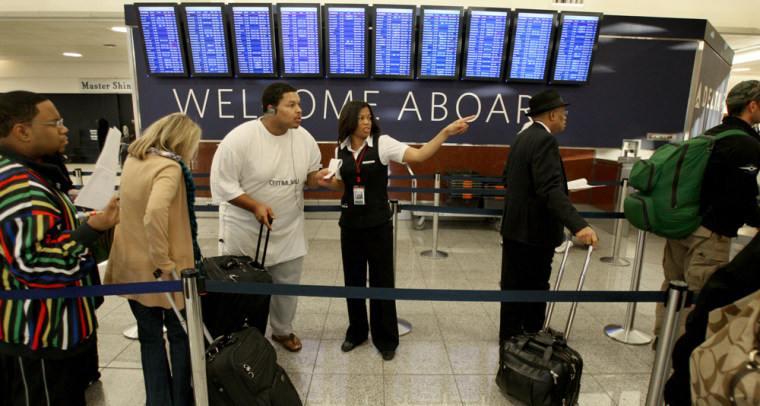For the second time in a little more than a year, a glitch at one of the two centers that handle flight plans for the nation's air travel system set off delays and cancellations for passengers around the country.
The snarl Thursday — traced to something as simple as a single circuit board — prompted calls for more money and manpower at the Federal Aviation Administration, which has struggled without success for years to overhaul the air traffic system.
The circuit board, at an FAA center in Salt Lake City, is part of a multibillion-dollar nationwide communications network that the agency has spent years installing as part of plans to modernize air traffic control.
A government watchdog said last year that the network was over budget and plagued by outages. On a single day in 2007 alone, the failure of parts of the network was responsible for 566 flight delays.
Aviation experts are unsure whether any system that relies on the interconnectedness of computers can prevent glitches from causing havoc unless there are sufficient backup systems to handle the thousands of flight plans filed each day in the U.S.
"A good communications system should have enough redundancy that a failure shouldn't hurt it that badly," said Michael Ball, a University of Maryland professor who specializes in aviation operations research.
Hundreds of flights were canceled or delayed from Atlanta to Houston to Phoenix after the problem began about 5 a.m. The glitch was fixed about four hours later, but scattered delays were reported throughout the day. Planes in the air were never in danger.
While the delays were not as bad as those caused by a major winter storm, passengers — already frustrated by add-on fees for checking bags and the other hassles of everyday air travel — were miffed.
"I am sitting here at the airport for an additional three hours when I could have been sleeping in," said Angelo Adams of Atlanta, waiting for a flight to Philadelphia.
Sisters Sharon Walker and Sheila James were taking their elderly mother, Rosa Washington, to see their other sister in St. Louis. Their 9:30 a.m. flight from Atlanta was delayed until 4 p.m.
"We were going to be there for a four-day weekend, but now it's getting cut short," James said. "It's just not a good day."
Lawmakers in Washington pounced. Sen. Charles Schumer, D-N.Y., said the country's aviation system is "in shambles" and the FAA needs more resources to prevent similar problems in the future.
"If we don't deliver the resources, manpower and technology (to) the FAA it needs to upgrade the system, these technical glitches that cause cascading delays and chaos across the country are going to become a very regular occurrence," he said in a statement.
Sen. Byron Dorgan, D-N.D., chairman of the Senate's aviation panel, said he plans to grill FAA Administrator Randy Babbitt about the issue at a Dec. 10 hearing. Rep. Jerry Costello, D-Ill., chairman of the House aviation panel, said he has asked the transportation inspector general to investigate and report to Congress within 60 days.
Airlines, reeling from the economic slowdown, were tallying their losses from the delays and cancellations. Several refused to estimate the cost. The Air Transport Association, an airline trade group, also could not give an estimate.
It was just a year and three months ago that the FAA had to deal with a similar headache. In August 2008, a software malfunction delayed hundreds of flights around the country.
In that episode, the Northeast was hit hardest by the delays, caused by a glitch at the Hampton, Ga., facility that processes flight plans for the eastern U.S.
FAA officials and an official for the union that represents the agency's technicians said Thursday's failure prevented air traffic control computers in different regions of the country from sending each other information about flights going back and forth.
The two large computer centers — in Salt Lake City and Hampton, an Atlanta suburb — were both affected, as were 21 regional radar centers around the country.
The problem began with the failure of a single small circuit board inside a router.
Air traffic controllers were forced to type in complicated flight plans themselves because they could not be transferred automatically from computers in one region of the country to computers in another, slowing down the whole system.
The equipment that failed was part of a telecommunication network owned and operated by FAA contractor Harris Corp. of Melbourne, Fla.
The FAA is investigating the cause of the failure and why a backup didn't immediately resolve the problem, FAA spokeswoman Laura Brown said.
Harris said in a statement that it is working with FAA to resolve the issue.
